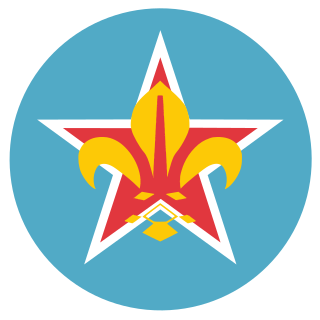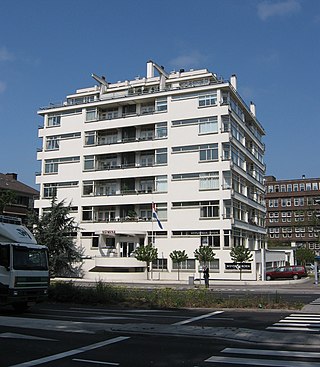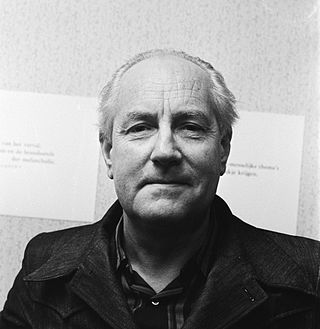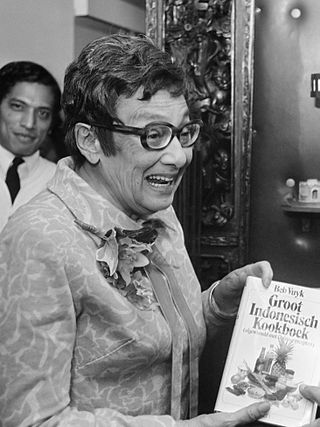
"Wilhelmus van Nassouwe", usually known just as "Wilhelmus", is the national anthem of both the Netherlands and the Kingdom of the Netherlands. It dates back to at least 1572, making it the oldest national anthem in use today, provided that the latter is defined as consisting of both a melody and lyrics. Although "Wilhelmus" was not recognized as the official national anthem until 1932, it has always been popular with parts of the Dutch population and resurfaced on several occasions in the course of Dutch history before gaining its present status. It was also the anthem of the Netherlands Antilles from 1954 to 1964.

Scouting in Aruba shared a common history with the other Netherlands Antilles until the political separation of the island from the Netherlands. Scouting Aruba is a Full Member of the Interamerican Region of the World Organization of the Scout Movement.

Charles Edgar du Perron, more commonly known as E. du Perron, was an influential Dutch poet and author of Indo-European descent. He is best known for his literary acclaimed masterpiece Land van herkomst of 1935. Together with Menno ter Braak and Maurice Roelants he founded the short-lived but influential literary magazine Forum in 1932.
Tjalie Robinson is the main alias of the Indo (Eurasian) intellectual and writer Jan Boon also known as Vincent Mahieu. His father Cornelis Boon, a Royal Netherlands East Indies Army (KNIL) sergeant, was Dutch and his Indo-European mother Fela Robinson was part Scottish and Javanese.

Karel Jonckheere as Carolus Joannes Baptista Jonckheere was a Flemish writer and critic. Widely traveled, he was inspired by his journeys for his poems and novels.

Nieuwe Zakelijkheid, translated as New Objectivity or New Pragmatism, is a Dutch period of modernist architecture that started in the 1920s and continued into the 1930s. The term is also used to denote a (brief) period in art and literature. Related to and descended from the German movement Neue Sachlichkeit, Nieuwe Zakelijkheid is characterized by angular shapes and designs that are generally free of ornamentation and decoration. The architecture is based on functional considerations and often included open layouts that allowed spaces to be used with flexibility. Sliding doors were included in some of the designs.

Sybe Minnema, known by his pen name Sybren Polet, was a Dutch prose writer and poet. He won numerous awards, among them the 2003 Constantijn Huygens Prize.

Robert Nieuwenhuys was a Dutch writer of Indo descent. The son of a 'Totok' Dutchman and an Indo-European mother, he and his younger brother Roelof, grew up in Batavia, where his father was the managing director of the renowned Hotel des Indes.

Elizabeth (Beb) Vuyk was a Dutch writer of Indo (Eurasian) descent. Her Indo father was born in the Dutch East Indies and had a mother from Madura, but was ‘repatriated’ to the Netherlands on a very young age. She married into a typically Calvinist Dutch family and lived in the port city of Rotterdam. Vuyk grew up in the Netherlands and went to her father’s land of birth in 1929 at the age of 24. 3 years later she married Fernand de Willigen, a native born Indo that worked in the oil and tea plantations throughout the Indies. They had 2 sons, both born in the Dutch East Indies.
The subjunctive in Dutch is a verb mood typically used in dependent clauses to express a wish, command, emotion, possibility, uncertainty, doubt, judgment, opinion, necessity, or action that has not yet occurred.

The Bataviaasch Nieuwsblad was one of the leading and largest daily newspapers in the Dutch East Indies. It was based in Batavia on Java, but read throughout the archipelago. It was founded by the famous Dutch newspaperman and author P. A. Daum in 1885 and existed to 1957.

Victor Ido is the main alias of the Indo (Eurasian) Dutch language writer and journalist Hans van de Wall. Born in Surabaya, Dutch East Indies from a Dutch father and Indo (Eurasian) mother. Ido was the Art Editor of P.A.Daum's Bataviaasch Nieuwsblad and later the Chief Editor of newspaper Batavia's Handelsblad as well as an accomplished musician (organist).

Dutch Indies literature or Dutch East Indies literature is the Dutch language literature of colonial and post-colonial Indonesia from the Dutch Golden Age to the present day. It includes Dutch, Indo-European and Indonesian authors. Its subject matter thematically revolves around the VOC and Dutch East Indies eras, but also includes the postcolonial discourse.

Pieter Steinz was a Dutch journalist, literary critic and non-fiction author. From 2012 to 2015 he was director of the Nederlands Letterenfonds.
Annie Foore was the pen name of Francisca Johanna Jacoba Alberta IJzerman-Junius. She was a Dutch-born writer who lived in Dutch East Indies. She was considered one of the most important European women authors writing in the Dutch East Indies.
Willem Poolman was a Dutch military officer and colonial administrator on the Gold Coast.

Johan Wilhelm Henri van Wermeskerken was a Dutch playwright, novelist and journalist. He is considered the most prominent comedic playwright in the literature of the Dutch East Indies. His greatest successes were plays Tropenadel (1916) and Suikerfreule (1917), both of which he later adapted into novels. Despite criticism from literary figures such as Rob Nieuwenhuys and E. du Perron, Van Wermeskerken's short story collection Langs den gordel van smaragd (1923) was hailed as his masterpiece. His work was part of the literature event in the art competition at the 1928 Summer Olympics.

Tim Hofman is a Dutch television presenter, journalist, poet, and columnist. Hofman often worked under the pseudonym of debroervanroos. He is, among other things, known as the presenter of the online program #BOOS, with which he won various awards.
Suwarsih Djojopuspito, in pre-1940 spelling Soewarsih Djojopoespito, was an Indonesian author, regarded as one of the most important Indonesian feminist writers, publishing from the 1940s to the 1970s. Among her most well-known works are the semi-autobiographical novel Buiten het gareel (1940) and the short story collection Empat Serangkai (1954). She was among the vanguard of early feminist authors in Indonesia that preceded the New Order, and was one of the first female writers to be published by the state publishing house Balai Pustaka.















